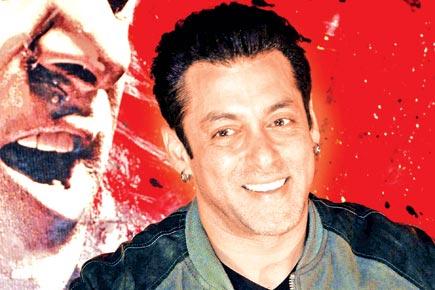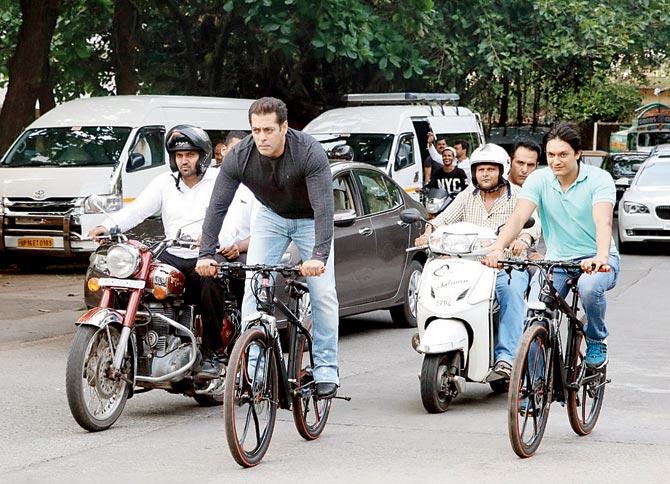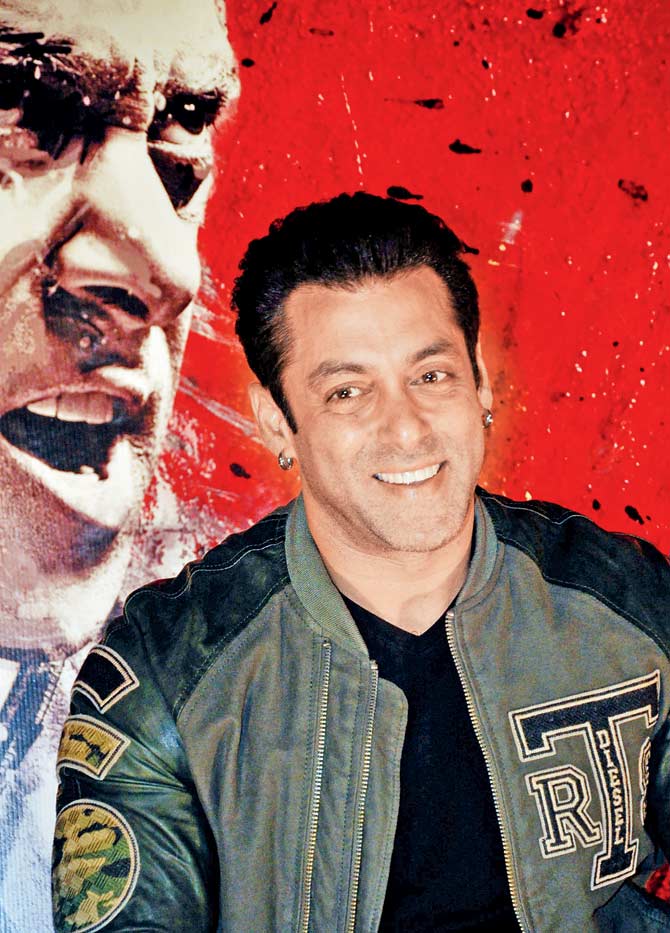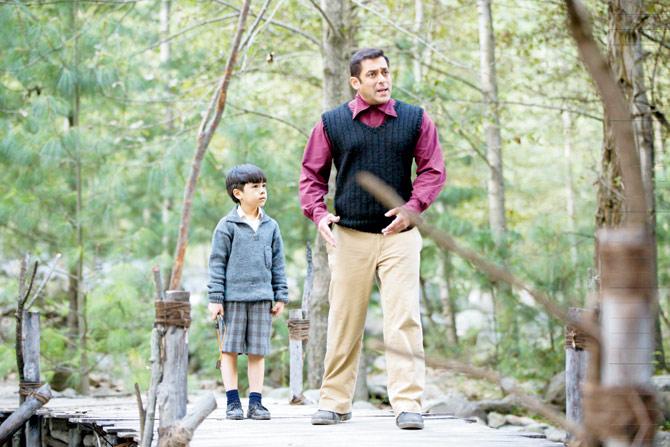Salman Khan in an exhaustive interview with mid-day talks about not-enough money, need-based love, luck, lawyers, and a full turnaround in his pictures and persona

Salman Khan

ADVERTISEMENT
So you've probably seen the video that went viral recently, where Salman Khan cycles down Bandstand, calling out to Shah Rukh outside his house, Mannat. It gives us strange pleasure to report that he was on his way to meet us at Hotel Taj Lands End that afternoon. Unpredictable, crabby even, Salman hasn't traditionally been a journalist's delight. Unlike the quotemeister SRK. On this day however, spiffy, chatty, Salman seemed the most relaxed, warmest version of himself: a pleasant surprise. As has been his career lately, the turning point of which we were hoping to needle and nail. What wasn't a surprise is how this interview got conducted: Salman, preferring to stand, and chat over smokes (thin Davidoff Lights), pacing up and down the meeting room, once in a while walking behind the befuddled interviewer, but always entertaining, and rarely sticking to a script. This is the Salman we still know, and he rarely disappoints.
You said in an interview recently that there was a time when you were losing grip on your career, you got back, and turned tables around. What was that time?
There was a time I wasn't getting the best of films. I was only doing films from the best I got offered. Even though you work hard on those films, there's the producer and director who don't let you do much. That was a disheartening time for me.
Roughly when was this?
My creativity at that point in time was more like 'koi ghont raha hai mujhe (someone's choking me)'. As it is I've picked a script that I think will be an average film. If they let me work on it, at least I could take it to the next level. That didn't happen for me. I got fed up one day and said I'd rather not work at all. But then I realised, if I don't work, how will I survive? So I went about it like a daily 9 to 5 job.
And then I saw one film (of mine), and felt this is really not working, man: 'Yeh ek baar chhap gaya (It's in print once), it's going to be there for life.' That's when I got my act together, said now whatever I do, I won't do it for the money, or that I have dates (available on my diary), or a friend is a director/producer. I would do a movie only for scripts. If I don't get those scripts for the longest, I'll do stage shows, TV, but I will not do a film. No way!
That said, my dad (screenwriter Salim Khan) once asked me during that phase: "You're the highest paid actor in India, but how much money do you think you have?" We went into the numbers, and he said that today, if there's a medical emergency in the family, and if money can save the person, we would not have the funds to make it happen. Because, after all the court cases, lawyer fees, etc, money used to come, and the same money used to go. Coming, going, coming, going… It started from magistrate court, then sessions court, then High Court, then Supreme Court; 20 years, bro! And people are thinking: Look at this upstart; he's romancing the hottest women, smiling (on screen). Arre, that's my job!
If we just go back a few years, 'Bodyguard', 'Ready' (both 2011), were your biggest blockbusters. Those films are impossible to compare with, say 'Bajrangi Bhaijaan', 'Sultan', or even 'Tubelight', for that matter. How do you explain this vast difference?
Every six to seven years, the whole writing scenario changes, with new writers coming in. They write their first few phenomenal scripts, taking off from their personal lives, and experiences. And so it all looks new. But how many (such scripts) can you write? Six, seven, eight?
But jab ek writer ki chal rahi hai (one writer is having a good run), he gives his best in the first three scripts. After that, the quality drops. You can't keep creating. The same thing happens with music composers. To answer your question, I got lucky that the good writers or scripts started coming to me
You've said before, rather cheekily, that one thing no one can fault you for is acting, because you don't act at all.
(Laughs) That I don't know how to act.

But you're actually playing very challenging characters now. You've already called Tubelight your toughest film ever.
The screenplays, stories I'm picking up are helping me hugely, so you may think that was a (great) performance. But it was not a performance at all. It's just the screenplay of the film taking me forward. You're not doing anything (different) actually. But you're looking like a superb actor. People are crying and laughing with you. But it's not you. It's the man who's written it, making you look awesome in the film.
By and large, your core or rather hardcore audience has forever been satisfied with you simply showing up on the screen as yourself.
It looks like that, but no. When somebody works so hard (during the day), takes time off to watch a film because he likes you, you have this responsibility of always being slightly better than in your previous film. It's not a Rs 5 ticket anymore. They must take something back with them. They shouldn't say, "Arre, mazaa nahin aaya." That is one thing I keep in mind all the time: When a film releases, people should really want to watch the movie, and then they should really like it.
I don't panic towards the end of the film. I panic when I hear a script. If I go, "Accha theek hai; ah, that's nice," then I would never do it. I have to say, "This is the most awesome thing I've ever heard." And it's always the first narration. I don't read. I make the director or writer narrate it to me. If I read it then I'll visualise it differently. I want to see what the director's vision of the movie is.
If you go back to the old-world definition of a 'Bollywood' star, it's usually been an actor who plays himself, or who's himself a character, like Dev Anand, for example. The young leading men now play dramatically different roles, where you can't usually tell one character from the other. Audiences don't accept them otherwise.
Yeah, it is really difficult.
In that sense, do you think you, or for that matter Shah Rukh Khan, are the last of the old-world Bollywood superstars?
It's not only that you get there, shoot a movie - rehearsal, action, cut, retake - and it's done. We've acted in, and produced so many films, so there are a lot of other things that we also take care of. We sit on the music, dialogue, story, setting, and very minute things, when we hear a script.
And then others come in, all of whom play a major part. So it's not one person's film. When you're working for so many hours under the sun or rain, and then there's lunch break, and the food's no good, then everyone's mood sours. So even the khanewala's (cook's) job on a set is as important as mine. The three meals have to be really good (laughs), otherwise everyone gets pissed off.
But you do know that if there isn't Salman in it, there is no big-budget movie, no matter how well the khanewala cooks.
I'm just saying that it's teamwork. What's the use of a focus puller, for instance, who shoots you out of focus in an action or jumping shot, and you have to keep doing it again and again? It's a bummer.
We've been observing you for almost 30 years. Not just your films, there's been a huge change in your public persona as well, lately. You were the unpredictable, aggressive type, or reported as that, up until a few years ago. You've mellowed like crazy. Was there a moment that changed you as a person?
Not really. I'm the same person. I still sit in rickshaws, walk, cycle; in fact, I just cycled here. There was, at one point in time, for whatever reason, a lot of negativity around me. I don't know what I did to deserve that negativity. And I never spoke about it. Later on, things automatically started clearing out. Till today, I'm told I'm the most misunderstood person there is. It's been 30 years that I've been here. How can I be misunderstood? If I'm indeed the most misunderstood still, then I might be the same person (that people think I am).
What gets your goat?
Now, say if someone comes and asks me something straight up, like this whole marriage shit. They're really not interested, you know that. They just want to chhapo that marriage thingy. That pisses me off. For me, I think marriage is a waste of money!
But you know why they do that. Fans want to read about you. That's what stardom's all about.
If you make a name from writing about someone, or your editor pats you on your back, or your viewership goes up, then at least show that man some respect. Because he's taken time out for you.
There are, I think, around 64 million people on my own social media platform. I can do everything there, and you'll pick it up anyway. When I tweet, it goes viral. I actually don't need to come and do this (interview) anymore. But I do it, only for the fact that there's a person whose profession this is, and from there, it goes out to fans, even if they are following me on social media.
Now it takes three minutes for me to stand and pose for photographs, "Baba, left, Bhai, right; left, right, left right." And kad-kad-kad-kad (makes clicking sounds). Now these pictures won't be fun, or great anyway, but still we all do it. It'd be very easy for me to carry a photographer along, and put all pictures up on my social media. But what's the use? You don't want to do everything.
I can't also buy the theatre, and pick up land and cultivate corn and potato for the samosa and pop-corn for the cinemas. Yeh kya baat hui? My job is to act. Let others make a living too. That's what I think.
Well, there's acting and there's stardom. One of the things we noticed, for example, with the new Forbes' highest earning entertainers list that just came out…
You know Shah Rukh and I were speaking last night, and we said, "Yeh kya (Forbes' list) hai? Hamesha, we fall short of money to buy this or that…" I still haven't been able to buy my house. I used to fall short by a few lakhs before, and then it became a crore, then few, and now I'm short by quite a few crores to buy my own place. And then this Forbes' list!
We'll come back to that. What I was talking about is that the Forbes' list of highest earning entertainers in the US is almost full of musicians. Hollywood studios just displaced movie stars with super-heroes, franchises, reboots and disaster films.
That's why I started singing (laughs).

Well they actually killed stardom there. And here, the top ones who can guarantee footfalls in the first weekend - you, Aamir, SRK, Akshay, Ajay - are in fact all pretty much from the '90s. Practically none, if hardly any, from the new lot.
I'll speak about myself. Starting out, I never saw myself in the scripts that came to me. I'd get worried. People would narrate subjects to me and I'd visualise Sanju, Jackie, Sunny. This happened to me for two years. And then came Maine Pyar Kiya (1989).
I used to earlier approach people with scripts that I'd written to direct. Which is what I wanted to do. And everyone would tell me I should be an actor. My father once said, "Yeh sab tumko tarka rahe hain (they're fobbing you off). Honestly, can you play a lawyer, a police inspector, a mohalle ka dada, who can take on people?" I said no. "Then what'll you play? A romantic hero? How long will that run? Couple of years. And then?" It made so much sense to me. Because back then, all the main actors, VK sir (Vinod Khanna), Amitji, Dharamji, were all 'men'. I was a 48-kilo li'l boy. That's when I really started working hard.
From then until now, if you see, all of us boys (from the '90s) have just grown. We're all in our 50s now, and we're still jumping, and it hurts, like crazy. But we're still working hard on ourselves because we know the value. We know a time when we wanted work, and we didn't have any.
And we all see the last 30 years like yesterday: "Kal kaam maang rahe thay yaar!" Till today all those people we've worked with - who may be nobodies now - once they come into the room, we stand up. That's the brand of men I'm talking about.
Also they've constantly upped the game.
Yeah, and so when new directors come in, you just have to learn to pick the right kind of scripts.
Which explains your $37 million per annum of personal income on the Forbes' list! Coming back to which, what do you do with that money; from what we know, you still live in a one-bedroom at Galaxy apartment.
I don't have that money. I seriously don't have that money. I was going through it and going, "Yeh paise kahan hai, bhai? Kidhar?" When a film makes Rs 500 crore, only a very nominal amount from that comes to you. It's just that your business is worth Rs 500 crore.
That said, one of the things we used to find cool about you is you never cared for others' opinions, or for money. As you mentioned, you'd just sign up films with friends or family, and make them work. Now you seem like a very astute businessman. Your Being Human products are in every mall we go to…
I'm the worst businessman ever. When you buy an Armani or Versace, the money goes to them. But with Being Human clothing, we have a partner who takes a certain amount. From what comes to us, we pay taxes, and then it goes back to Being Human. The same thing with cycles, jewellery… Our business interest is towards what we can put into the charitable trust. We were already putting in a lot. But if I ask a friend for help, after a couple of times, he'll back off, and I'll lose a friend.
So yes, there is money coming in, because of who I am today. Because my fans go to theatres to watch my movies, or shows, or television, that brings in ad revenues. And then you choose to give back. And my parents have done this all their life. It's just that we have a brand name to channelise the whole thing.
Are you coming out with Salman cell phones as well?
Not Salman cell phones (laughs). We're launching phones, yes. Even with cycles, we started with just 300, and they sold out. Now we've placed an order for 4,000.
Those are Being Human cycles. So there'd be Being Human cellphones?
Being Smart cellphones. It's a no-inventory business model. You go to the Being Human retailer, pre-order it, and that's what we supply. Not an extra phone is manufactured. Our overheads are zero.
The foundation is run by my father (Salim Khan), Dr Sandeep Loretta, Baby (Alvira) and Arpita [sisters] , that's it. Even with the clothing line, Mandan (my partner) has got his staff, but we have only two people from our end. The same with cycles - there's Atul sir (brother-in-law Atul Agnihotri), and Deval. As with jewellery - only Arpita's handling from our end, and they (PNG, partners) have their own crew. And this works only because it's taken us 30 years, with all the negativity around, to build trust: "Ki yeh humko dhokha nahin dega." That could change anytime.
So you're not really sitting in the office and looking over it like a pucca businessman?
I'm working all the time. I'm shooting, there's work on scripting, producing. Then I've got five court cases going on. I also need to spend time with family. Then I approve the entire clothing line. Arpita and I approve the jewellery designs. Soon we'll start work on gym equipment. These things take a lot of time. But then the people I'm working with I've known for the longest.
So with cycles, for instance, some parts are manufactured in China, and my childhood friends - Ash and Jaggi - are doing it, because that's what they do, based out of Dubai. I used to know Jaggi when I was 12. He used to deal in cars. Back then he'd hold my finger while driving in a Mahindra jeep. I'd be on a cycle. And he'd take me around. We've still not left hands.
Coming back to films, tell us something about the romantic angle in your latest, Tubelight.
(Gets close; gently places his hand over the interviewer's on the desk). This is the beautiful romantic angle in Tubelight.
The reason I ask is even if it's a Salman action movie, there's always some lesson on love, especially for single people. I remember one sermon, when crowds went crazy in Wanted: "Don't chase girls. Chase money. Girls will chase you instead!"
Ah, yeah, chase money. True.
Do you have a personal idea or thought on love per se?
Yeah. I don't believe in love at all. I don't think there's any reason for the word 'love' to exist. The word is 'need'. It depends on whose need is more. Or who you might need at some point. But she may not need you at all. This can also turn the other way round, when you don't need her sometimes. So, basically, the need has got to be equal at all times. Which may or may not happen.
Then there is companionship, habit - that you've been together for so long - emotional connect, or the fact that both of you have flaws but you're aware of the larger picture, and that you're happy together. But 'love' is, essentially, need.
It's need-based or conditional, you mean.
Yeah.
How do things work when you're single, but extremely rich, famous, and powerful? Do you second-guess women, double-check if she may even be interested in you as a person at all?
Like I said, I don't have money.
Of course you do. Forbes can't get away with lying in their report!
Arre, Forbes ko kya pata ki mere kharche kitne hain? Every time the lawyers go to court for me, they charge as much, or even more, than I make. We do about, what, 10 appearances in a year? Inke ho jaate hain 70-80 appearances in a year! (laughs)
Fine, let's go with famous and powerful. Does it get harder to find women, or new friends, without assuming that there's an agenda?
Whenever you meet someone, they always put their best side or foot forward. Later, you get to know their flaws. You just need to balance this with the basic question: Would you able to live with it (the flaws) for the rest of your life?
Final question: You've been one of the top mass figures for almost 30 years. You also work in films where people go to vote every weekend. What changes have you seen in India, especially over the past few years, so far as the public, or their politics, or their reaction to public figures is concerned?
I think the younger generation is blessed with a lot of compassion and scruples. I'm fortunate to have a Hindu mother and a Muslim father. Nowadays I see a lot of youngsters for whom these things just don't matter - I'm Salman Khan, film releasing in Ramadan, and people go and watch Prem! All my life I've been Prem. So for them, there is no Hindu, no Muslim. It's just good people, or bad people; that's it.
Have you seen a change in that mindset, lately, or over the years?
It's changing. But soon as the younger generation starts growing up, it'll be a different world altogether. I see my nephews, who're so correct. When they see someone sleeping on the street, they take their clothes off, and part with their money. And I don't just see this in my family.
The general perception is that we're regressing as a society, with respect to openly expressing hate, bigotry.
That is because everyone wants to be really negative. But everything will change, especially on social media, the moment you're made to reveal your real identity, instead of hiding behind curtains. If you say something, whether under a real or fake identity, you ought to be held responsible for that. After that, all you have to say is, "Yaar, I didn't understand it, and I'm really sorry." You can be forgiven for it too.
Have you become more cautious as a public figure given the times now?
Obviously, I'll try and say the most correct things. To get your TRPs, you'll twist it around. The job (of being cautious) is not ours. The responsibility lies at your end. Just so your magazine or TV channel can make some money, you can't use bits and pieces from some place and turn things around. You know that you're doing it, and despite that, you do it.
If I've said something wrong, and you believe this is going to create trouble, why would you put that up? In fact it's your duty as a journalist to tell me, "Yaar, Salman, this is actually a wrong thing, and this is how it should be." Your job is to bring people together (through) your star. Unless he's (the star is) corrupt, casteist, communal, stealing from people, then you can bajao me.
 Subscribe today by clicking the link and stay updated with the latest news!" Click here!
Subscribe today by clicking the link and stay updated with the latest news!" Click here!






